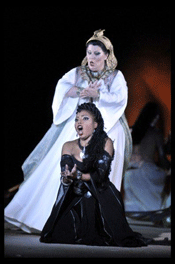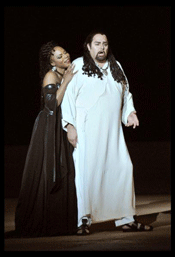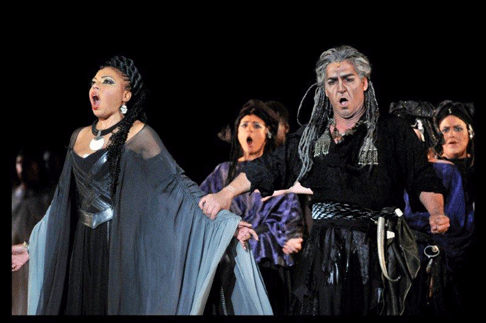![Aida Israel Opera [Photo by Yossi Zwecker]](http://www.operatoday.com/Aida_Israel_01.gif)
15 Jun 2011
Israel Opera cuts wide swath at festival
Israel Opera’s summer festival grew astonishingly in the year following its 2010 inaugural season.
English Touring Opera are delighted to announce a season of lyric monodramas to tour nationally from October to December. The season features music for solo singer and piano by Argento, Britten, Tippett and Shostakovich with a bold and inventive approach to making opera during social distancing.
This tenth of ten Live from London concerts was in fact a recorded live performance from California. It was no less enjoyable for that, and it was also uplifting to learn that this wasn’t in fact the ‘last’ LfL event that we will be able to enjoy, courtesy of VOCES8 and their fellow vocal ensembles (more below …).
Ever since Wigmore Hall announced their superb series of autumn concerts, all streamed live and available free of charge, I’d been looking forward to this song recital by Ian Bostridge and Imogen Cooper.
Although Stile Antico’s programme article for their Live from London recital introduced their selection from the many treasures of the English Renaissance in the context of the theological debates and upheavals of the Tudor and Elizabethan years, their performance was more evocative of private chamber music than of public liturgy.
Evidently, face masks don’t stifle appreciative “Bravo!”s. And, reducing audience numbers doesn’t lower the volume of such acclamations. For, the audience at Wigmore Hall gave soprano Elizabeth Llewellyn and pianist Simon Lepper a greatly deserved warm reception and hearty response following this lunchtime recital of late-Romantic song.
For this week’s Live from London vocal recital we moved from the home of VOCES8, St Anne and St Agnes in the City of London, to Kings Place, where The Sixteen - who have been associate artists at the venue for some time - presented a programme of music and words bound together by the theme of ‘reflection’.
'Such is your divine Disposation that both you excellently understand, and royally entertaine the Exercise of Musicke.’
‘And there was war in heaven: Michael and his angels fought against the dragon; and the dragon fought and his angels, And prevailed not; neither was their place found any more in heaven … that old serpent … Satan, which deceiveth the whole world: he was cast out into the earth, and his angels were cast out with him.’
There was never any doubt that the fifth of the twelve Met Stars Live in Concert broadcasts was going to be a palpably intense and vivid event, as well as a musically stunning and theatrically enervating experience.
‘Love’ was the theme for this Live from London performance by Apollo5. Given the complexity and diversity of that human emotion, and Apollo5’s reputation for versatility and diverse repertoire, ranging from Renaissance choral music to jazz, from contemporary classical works to popular song, it was no surprise that their programme spanned 500 years and several musical styles.
The Academy of St Martin in the Fields have titled their autumn series of eight concerts - which are taking place at 5pm and 7.30pm on two Saturdays each month at their home venue in Trafalgar Square, and being filmed for streaming the following Thursday - ‘re:connect’.
The London Symphony Orchestra opened their Autumn 2020 season with a homage to Oliver Knussen, who died at the age of 66 in July 2018. The programme traced a national musical lineage through the twentieth century, from Britten to Knussen, on to Mark-Anthony Turnage, and entwining the LSO and Rattle too.
With the Live from London digital vocal festival entering the second half of the series, the festival’s host, VOCES8, returned to their home at St Annes and St Agnes in the City of London to present a sequence of ‘Choral Dances’ - vocal music inspired by dance, embracing diverse genres from the Renaissance madrigal to swing jazz.
Just a few unison string wriggles from the opening of Mozart’s overture to Le nozze di Figaro are enough to make any opera-lover perch on the edge of their seat, in excited anticipation of the drama in music to come, so there could be no other curtain-raiser for this Gala Concert at the Royal Opera House, the latest instalment from ‘their House’ to ‘our houses’.
"Before the ending of the day, creator of all things, we pray that, with your accustomed mercy, you may watch over us."
The doors at The Metropolitan Opera will not open to live audiences until 2021 at the earliest, and the likelihood of normal operatic life resuming in cities around the world looks but a distant dream at present. But, while we may not be invited from our homes into the opera house for some time yet, with its free daily screenings of past productions and its pay-per-view Met Stars Live in Concert series, the Met continues to bring opera into our homes.
Music-making at this year’s Grange Festival Opera may have fallen silent in June and July, but the country house and extensive grounds of The Grange provided an ideal setting for a weekend of twelve specially conceived ‘promenade’ performances encompassing music and dance.
There’s a “slide of harmony” and “all the bones leave your body at that moment and you collapse to the floor, it’s so extraordinary.”
“Music for a while, shall all your cares beguile.”
The hum of bees rising from myriad scented blooms; gentle strains of birdsong; the cheerful chatter of picnickers beside a still lake; decorous thwacks of leather on willow; song and music floating through the warm evening air.
![Aida Israel Opera [Photo by Yossi Zwecker]](http://www.operatoday.com/Aida_Israel_01.gif)
Israel Opera’s summer festival grew astonishingly in the year following its 2010 inaugural season.
Then it was Opera at Masada, where Verdi’s Nabucco was performed in a mammoth new open-air theater set between the mountain central to Jewish identify and the Dead Sea. A recital by Jesse Norman was included in the season.
This year it was the Masada Dead Sea and Jerusalem Opera Festival Six performances of Verdi’s Aida were set for at Masada, while Verdi’s rarely performed Jerusalem, a revision of his I Lombardi, was staged at Sultan’s Pool, once a reservoir in Jerusalem’s historic water system. This was also a season of collaborations that contributed greatly to plans by Israel Opera’s inventive general director Hanna Munitz to make this a destination festival on a level with long established programs in Europe.
Special this year was the Masada performance of Verdi’s Missa da Requiem by orchestra and soloists from Arena di Verona, the Italian festival that reaches back to 1913. In the performance the opened the season on June 3 Giuliano Carella conducted the Verona forces, plus the Israel Opera Chorus and Tel Aviv Philharmonic Choir. The Verona guests further offered an evening of opera’s greatest hits at Sultan’s Pool, attended by 5000 enthusiastic fans. Star of that show was internationally celebrated tenor Setfano Secco in such favorites as “Nessun dorma” and “E lucevan le stelle.” Carella made the evening a success despite a sound system unfair to the instrumentalists involved.

Once the fireworks of the Triumphal March were out of the way, Aida, seen on June 5, seemed a work not terribly well suited to the vastness of Masada. In the essential duet that results in Aida’s confession of her love for Radames, Aida and Amneris seemed lost in the desert night and without the dramatic personal confrontation that sets the scene for the rest of the story.
Happily, things improved after intermission when China’s Hui He made her entrance on a camel. And it was He who earned high marks for her work in the title role. A former IO Tosca, He was a strong but gently female Aida whose love grew ever greater when challenged.
Of course, it’s hard to avoid the feeling that Verdi stacked the cards against Egyptian Princess Amneris, who has little chance of winning the sympathy of an audience. Amneris is primarily a public person, never intended to be passion’s plaything. In the role Hungarian-born mezzo Ildiko Komlosi was a regal presence, conscious of her role in the conflict between public and personal feelings. Yet it was clear that she had no choice in setting the events that would lead to Radames’ death in motion.

Although in appearance hardly a dream Radames Pierre Giuliacci, a familiar figure at European festivals was equally heroic and sensuous as Radames. Veteran bass Paata Burchuladze brought dignity to High Priest Ramfis. Born is a Georgia then part of the Soviet Union, Burchuladze has been an Israel favorite since he sang the title role in the Boris Godunov that opened the opera house in Tel Aviv in 1995. (Thus Israelis overlook an increasingly wide vibrato that is irritating to non-fans.) Italy’s Roberto Frontali made his IO debut as a movingly human Egyptian King Amonasro.
The staging, directed by Charles Roubaud, was largely straightforward. Sets by Emmanuelle Favre were minimal — four sphinxes and a huge royal statue — and wisely made no effort to compete with impressive natural surroundings. Costume designer Denise Dufolt appeared to have found a bargain in white cotton, the dominant material in mob scenes, but unflattering to the full figure of Giulliaci.
Especially effective were projections onto Masada Mountain designed by Nicolas Topor. The production added a bit of local color by including residents of a local Bedouin village in lieu of a dance ensemble. Daniel Oren conducted the IO Orchestra Rishon LeZion.
The sound system failed for a moment late in the production, stressing that technology is never totally reliable. Nonetheless, this was all in all a successful, if not memorable Aida, but as entertainment no match for the exuberance of the 2010 Nabucco, which reached its high point when conductor Daniel Oren conducted the audience in a “community sing” repeat of the famous chorus “Va, pensiero.” Aida does not invite such audience participation.

Aida was a co-production with Les Choragies d’Orange and will be staged at the Roman Theatre in Orange.
The current season concluded with a Masada concert by Italian tenor Andrea Bocelli on June 12. In a further expansion of the season, 30 chamber concerts were performed in Jerusalem at places of worship and historic sites in the city.
Bizet’s Carmen has been announced as the major opera of the festival’s 2012 season.
While European cultural capitals have their castles and cathedrals Israel offers the visitor over 2000 years of — often tormented — history. Even so, archeological activity continues at break-neck speed.
Israel is a small and easily manageable land. Tel Aviv and Jerusalem, its major cities, are an hour apart, and the drop from Jerusalem to the Dead Sea is approximately that distance. Where but in Israel can one float in the Dead Sea, have dinner and head for an opera at Masada all in one afternoon?
Wes Blomster